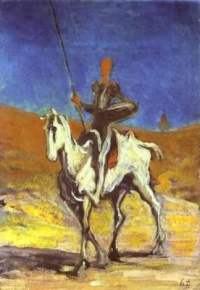Chanson de geste
From The Art and Popular Culture Encyclopedia

|
"The popular ballads, or cantilènes, as French writers have styled them, where the exploits of the great Charles were sung and handed down from his own to later days, formed at once the basis of the longer chansons de geste and of such spurious relations as Turpin's Chronicle. Wholly distinct from sober history, as recorded in works such as Eginhart's "Memoir of Charlemagne," written in Latin, and therefore accessible to but few, they were composed in the language of the people, uncommitted to writing, and consequently subject to all the diversifying and differentiating influences of oral tradition."--History of Fiction (1814) by John Colin Dunlop |
|
Related e |
|
Featured: |
The chanson de geste is a medieval narrative, a type of epic poem that appears at the dawn of French literature.
Chanson is French for song and geste is French for deed. Understood are, of course, heroic deeds.
The earliest known poems of this genre date from the late 11th and early 12th centuries, shortly before the emergence of the lyric poetry of the troubadours and trouvères, and the earliest verse romances. They reached their highest point of acceptance in the period 1150–1250.
Composed in verse, these narrative poems of moderate length (averaging 4000 lines) were originally sung, or (later) recited, by minstrels or jongleurs.
Much mediaeval French poetry and literature was inspired by the legends of the Matter of France, such as the The Song of Roland and various other chansons de geste.
See also

